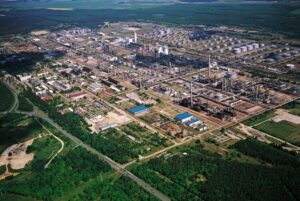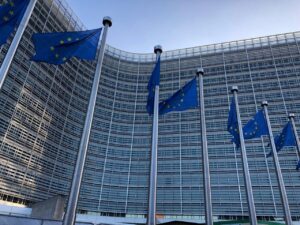The European Commission started formal efforts to receive from Member States the mandate to negotiate with Russia the legal regime in which the Nord Stream 2 gas pipeline will operate & presented its proposal of this mandate on 26 June at the meeting of the Transport, Telecommunications and Energy Council (TTE, referred to henceforth as the Council of the EU).
The European Commission explained that it has taken action because it does not want the project to be implemented in an uncertain legal situation and because it is keen to ensure that EU law is fully applied in the case of the pipeline’s onshore sections. According to information available to the general public (the EC’s press realese of 9 June 2017), the commission wants the legal framework for Nord Stream 2 (the offshore section of the pipeline) to take into account the fundamental principles stipulated under the EU’s energy law and international law, including:
– the transparency in the planned gas pipeline’s operation,
– non-discriminative tariff-setting,
– adequate level of non-discriminatory third-party access to the planned gas pipeline,
– separation of supply and transport activities to a certain extent (the EC has not yet determined this).
At the same time, the European Commission upholds in press release its earlier opinion that Nord Stream 2 will not contribute to achieving the goals of diversifying the sources, routes and suppliers to the EU market laid out in the documents on Energy Union—it will have quite the opposite effect and puts at risk existing supply routes, including this via Ukraine. The European Commission also confirms its engagement in improving the EU’s energy security and the implementation of the EU’s diversification strategy, for example, by means of building the Southern Gas Corridor and facilitating access to LNG. At the same time, the European Commission emphasised the importance of regional co-operation and confirmed its support for key projects in Central, Eastern and South-Eastern Europe, including the Poland-Lithuania and Finland-Estonia interconnectors. It once again pointed at its engagement in facilitating the implementation of the new northern corridor (Norway-Denmark-Poland connection).
Thirteen ministers responsible for energy issues representing various EU member states – Italy, Portugal and Central and Eastern European and Scandinavian countries – took part in the discussion on the proposed mandate on 26 June. According to information available, the vast majority of those taking part in the discussion backed – more or less unambiguously – the idea of granting the European Commission the mandate to negotiate with Russia Nord Stream 2 legal framework. However, the countries participating in the discussion seem to have very different visions of what this mandate should contain. All the participants of the discussion were allegadely firmly opposed to the implementation of Nord Stream 2 project, and most of them pointed to the political consequences the implementation of the project will entail. Fifteen member states expressed no opinion during the talks on European Commision’s NS2 mandate, including Germany, Austria, France and the Netherlands, which support this project (companies from these countries are engaged in the implementation of NS2).
The formal vote to grant the European Commission the mandate to negotiate with Russia on Nord Stream 2 might take place according to the EC as soon as in the autumn of this year, during the Estonian presidency. However, it may as well take much longer, at least a few months, for the member states to develop its final version. The European Commission wants to discuss its vision of the mandate on Nord Stream 2 with Russia in late August or early September.
Commentary
- The European Commission’s press release concerning the mandate is rather vague. Its wording suggests that it does not envisage the imposition of the requirement of complete ownership unbundling in the case of Nord Stream 2 and that the principle guaranteeing third-party access to the gas pipeline would only partly apply (it is unclear to what extent). It is also unclear what kind of agreement the European Commission would like to sign with Russia. As a consequence, the European Commission’s proposals have been commented on in the media as unambitious. It is well known that Donald Tusk, the president of the European Council, made efforts to ensure a stronger mandate for the European Commission already before it was adopted by the College of Commissioners. Tusk appealed to the European Commission to apply both EU energy law and political goals to the project to the full extent. Elżbieta Bieńkowska was the only one among EU Commisioners to vote against adopting the mandate proposal in its present form – claiming that it was too weak – during the vote at the commission (according to media reports the Romanian commissioner also presented his objections after the vote).
- The European Commission’s press release devoted a disproportionately large space to the description of its goals and present and planned actions linked to the diversification of supply routes and sources to Central and Eastern Europe. During the meeting with journalists on 14 June, Maroš Šefčovič, the vice- president of The European Commission in charge of the energy union, admitted that Nord Stream 2 would affect the entire architecture of gas networks in Europe, would potentially adversely affect the situation in Central European countries, and would have a very bad impact on the situation in Ukraine. However, it is not obvious whether and how the European Commission plans to make these issues and the diversification goals part of its formal mandate to conduct talks with Russia concerning Nord Stream 2 (and if it is able to do this) and what precise actions it envisages to this effect.
- There are great differences between the stances adopted by the member states as regards the Nord Stream 2 project itself, the mandate and the role the European Commission might play in the discussions concerning the project:
– Sweden and Denmark reacted positively to the fact that the European Commission launched formal efforts to receive the mandate and clearly backed it. These two countries view the European Commission’s moves as a success of their efforts to make the commission engaged in the assessment of the project as affecting the entire European Union. Nord Stream 2 AG has applied to both Denmark and Sweden, asking them to grant environmental permits for building the gas pipeline in their exclusive economic zones (and in the Danish territorial sea). Before these permits are granted, the two countries wanted to learn what legal space the project would be functioning in.
– Some EU member states, including Poland (and its opinion, according to media reports, is shared, amongst others, by the Baltic states and Romania), believe that the mandate proposal presented by the European Commission is too weak. According to media reports, during the discussion on 26 June, some countries appealed that the European Commission in any future negotiations with Russia should insist on EU law being applied to Nord Stream 2 to the full extent. Poland also suggested that the project implementation issue should become a topic for the European Council.
– A number of actors have questioned the need to grant the mandate to the European Commission, to conduct EU-Russia talks and to develop a special legal regime for Nord Stream 2. This is the stance of the Nord Stream 2 company, which reacted to the commission’s proposals in an immediate and detailed manner, claiming, for example, that by acting like this the European Commission is politicising the project and discriminating against it. Similarly, the EC search for the mandate has been criticised by Gazprom and Germany. These two actors claim that there is no need to grant the European Commission with the mandate to discuss Nord Stream 2 because it’s legal situation is clear & the project is of purely economic nature. It cannot be ruled out that a similar stance will be adopted by other countries which support the project. Finally, six European transport system operators (Gas Connect operating on the Austrian market, Net4Gas operating on the Czech market and Fluxys, Gascade, Gasunie and ONTRAS operating on the German market) protested against the mandate and the special legal regime for Nord Stream 2 in a letter addressed to the President of the European Commission, Jean-Claude Juncker.









